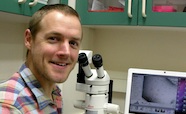

Dr Peter Mace
Dr Peter Mace is a Research Fellow supported by the Rutherford Discovery Fellowship. His current work is starting up an independent research lab.
“I could find most things interesting to be honest, once you start to get into it,” Peter says.
He had come from Tokoroa to study medicine at Otago. Early in his second year he realised that he was more interested in the basic biology underlying human health, so he changed his course—completing a BSc(Hons) and PhD in biochemistry.
He credits his PhD and postdoctoral supervisors as being essential contributors to both his research direction and career guidance.
Peter says that the biggest test was to go overseas and broaden his horizons. The opportunity to be really productive in a very good lab in the US was invaluable.
Peter's research is in understanding the structural biology of signalling proteins that regulate a cell's decision to proliferate (trigger cancer), or to die. He is looking at how these signalling switches can be disrupted.
“What excites me about my work is the constant challenge and excitement of making new discoveries that you are the first person to know about, ever. Also the potential that discoveries I make about basic disease processes could help medical outcomes of patients, be it through directly finding out about a protein's mechanism of action, or just helping another group see a drug target in a particular way.”
Peter's advice is to use the postdoctoral period to set up for whatever you want to do next. He suggests it is a good juncture to critically assess your future direction, and then shape your postdoctoral experience towards that.
“My Health Sciences Postdoctoral Fellowship was a catalyst to kick-start my research career. A great opportunity just when I started really knowing my way around the lab, and how to put together a project. The additional papers and awards I had on my CV subsequently, allowed me to be competitive for a postdoc fellowship in the USA right from the start.
“I was able to go overseas with success and confidence under my belt. This meant my postdoc overseas was more productive and allowed me to change fields slightly. Working with broader scope gave me an edge, and enabled me to get a fellowship to come back to New Zealand.
“I think it's a vital scheme for both individuals' careers and strengthening research at Otago.”